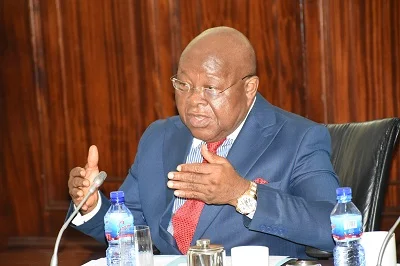The New Patriotic Party (NPP) has embarked on a comprehensive introspection following its defeat in the 2024 general elections, marking a significant turning point in the party’s trajectory. The culmination of this self-assessment is the submission of a detailed report by a specially appointed committee, chaired by former Speaker of Parliament, Prof. Aaron Mike Oquaye. This report, presented to the National Executive Committee (NEC) during an emergency meeting, delves into the multifaceted reasons behind the NPP’s loss of both the presidency and its parliamentary majority, a double blow that has shaken the party’s foundations. The report’s findings are expected to serve as a blueprint for restructuring and revitalization as the NPP navigates its path back to political dominance.
The Oquaye Committee, comprising twelve members, was entrusted with the crucial task of dissecting the factors that contributed to the NPP’s electoral setback. Their investigation undoubtedly involved a thorough examination of various aspects, including campaign strategy, messaging, party organization, and the prevailing political landscape. The loss of the presidency to the National Democratic Congress (NDC)’s John Dramani Mahama and the significant reduction in parliamentary seats underscored the urgency and importance of the committee’s work. The report’s presentation marks the beginning of a crucial phase for the NPP, as it grapples with the implications of its findings and charts a course forward.
The NPP’s response to the report has been swift and decisive, indicating a commitment to addressing the identified shortcomings. Immediately following the report’s submission, the party formed a nine-member committee tasked with reviewing the NPP constitution. This move signifies an acknowledgement that structural and organizational weaknesses may have played a role in the electoral defeat. By revisiting its foundational document, the NPP aims to identify areas for improvement and modernize its operations to better align with the evolving political dynamics of Ghana. This constitutional review underscores the party’s determination to learn from its mistakes and emerge stronger and more resilient.
The presentation of the report and the subsequent formation of the constitutional review committee took place at an emergency NEC meeting, a gathering that underscored the gravity of the situation. The meeting was attended by a constellation of influential figures within the NPP, including former President Nana Addo Dankwa Akufo-Addo, 2024 presidential candidate Dr. Mahamudu Bawumia, former running mate Dr. Matthew Opoku Prempeh, and Minority Leader Alexander Afenyo-Markin. This high-level participation demonstrates the party’s collective resolve to address the challenges head-on and pave the way for future electoral success. The presence of key leadership figures signals a unified front in navigating the post-election period and preparing for the political battles ahead.
While the specific contents of the Oquaye report remain confidential, the NPP General Secretary, Justin Kodua Frimpong, has assured the public that the findings and recommendations will be communicated in due course. This measured approach reflects the party’s desire to thoroughly digest the information and formulate a comprehensive strategy based on the report’s insights. The internal reflection and deliberation that will precede public disclosure underscore the NPP’s commitment to a thoughtful and strategic response, rather than a hasty reaction. This period of internal review will allow the party to develop a cohesive and effective plan of action.
The NPP’s current undertaking represents a critical juncture in the party’s history. The comprehensive review of its electoral performance and the subsequent constitutional review demonstrate a commitment to self-improvement and a willingness to adapt to the changing political landscape. The party’s response to the Oquaye report will be closely watched by political analysts and the Ghanaian public alike, as it will provide valuable insights into the NPP’s future direction and its ability to regain lost ground. This period of reflection and reform will be instrumental in shaping the NPP’s narrative and determining its success in future elections.














